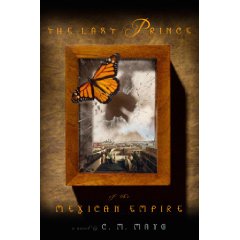|
Amigos
de la Universidad de Chicago (University of Chicago Alumni Association,
Mexico)
 Apropos of the presentation of the novel
The Last
Prince of the Mexican Empire, in Mexico City, September
2009 Apropos of the presentation of the novel
The Last
Prince of the Mexican Empire, in Mexico City, September
2009
>>Click
here to view photos.
Entrevista
C.M. Mayo. BA '82 y MA'85
¿Por
qué decidiste estudiar en la Universidad de Chicago?
Because,
on multiple levels, I was bored with highschool and as the University
of Chicago had a long-standing policy of accepting younger-than-usual
students, I could skip my last year and start in the College
at seventeen. My grandfather, Frank R. Mayo, who earned his undergraduate
degree and PhD in chemistry from the U of C, was delighted that
I chose his alma mater, but I have to admit, at the time, this
wasn't a factor in my decision. Later, I developed many more
thoughtful reasons for appreciating the U of C and I feel very
fortunate to have been able to study there.
¿Qué
y cuándo estudiaste en ella?
I
have a BA (1982) and an MA (1985) in economics (as Catherine
Mansell— C.M. Mayo
is my pen name). As an undergraduate, though I majored in economics,
most of my courses were in other subjects, everything from French
to Asian history to astrophysics. I recall a strong emphasis
on critical reading and writing. Once I toted up the number of
papers I'd been obliged to write as an undergraduate— I think it was more than fifty.
In sum, I don't think of my college years as being all that much
about economics; it was more a very eclectic liberal arts education.
¿Quién
fue tu mejor amigo durante tu estancia allá?
My
husband, Agustin Carstens (PhD 1985), whom I met in the graduate
program in economics.
¿Cuántos
mexicanos había en tu programa?
As
an undergraduate, I don't recall meeting any Mexicans. However,
there were many Mexicans in the graduate programs in economics
and business. I also had Mexican friends in the graduate programs
in history and statistics.
¿Qué
tan difícil es para un mexicano estudiar en los EEUU?
You
mean once he or she has been accepted? It depends on the individual's
characteristics (personality, habits, preparation, goals) far
more than his or her country of origin. The U of C is not a place
with any strong pressure to conform; there are students from
all social and ethnic backgrounds and, probably, all the continents
other than Antarctica. I have the impression that most of the
Mexicans I knew in the graduate programs at the U of C thrived
because they were well-prepared, ambitious, and extremely hard-working.
¿Por
qué recomendarías la Universidad de Chicago?
It's
one of the few places where there is a genuine "life of
the mind." Many of the graduate programs are among the best
in the world and the college is in the shadow of the graduate
programs, rather than the other way around. Plus the campus is
beautiful and the libraries and facilities superb.
¿Cuál
fue tu mejor profesor y qué materia te impartió?
In
economics, Gary Becker (Economics of the Family), Arnold Harberger
(Project Evaluation), and also, Harry Harootunian's courses in
Far East Studies, which got me interested in Japanese fiction.
¿Qué
tanto te ha servido lo estudiado en Chicago en tu vida profesional?
Indispensable.
¿Qué
te gusta de Chicago?
The
skyline as seen from Lake Michigan. The deep-dish pizza. The
Seminary Co-op Bookstore.
About
your book: As a distant
mirror, how do you see Mexican society in that period?
It
had a very different, hazier, and less confident self-image than
it does today. Not all certainly, but a substantial number of
Mexicans then believed that the only way to stability and prosperity
was to have the monarchical form of government, and for a sovereign,
a European. For we (I mean both Americans and Mexicans) who have
been born and raised in Republics, it is easy to forget that
in centuries past there was a profound, if not universally shared,
respect for the monarchical form of government. For most of us
today, royalty are little more than a subspecies of celebrity
we might happen upon in Hola or People, posing
rigidly in a funny hat or, perhaps, skiing, or apologizing for
some all-too-human naughtiness. But Mexicans today are not subjects;
they are citizens. It is an incandescently different thing to
be a citizen.
As
long-time observer of Mexican society, what do you think is most
interesting and worrying characteristics?
Interesting:
The endless labyrinth of its diversity and complexity.
Worrying: You know, maybe what we all need to be worrying about
is the honeybee. I am not kidding. |

